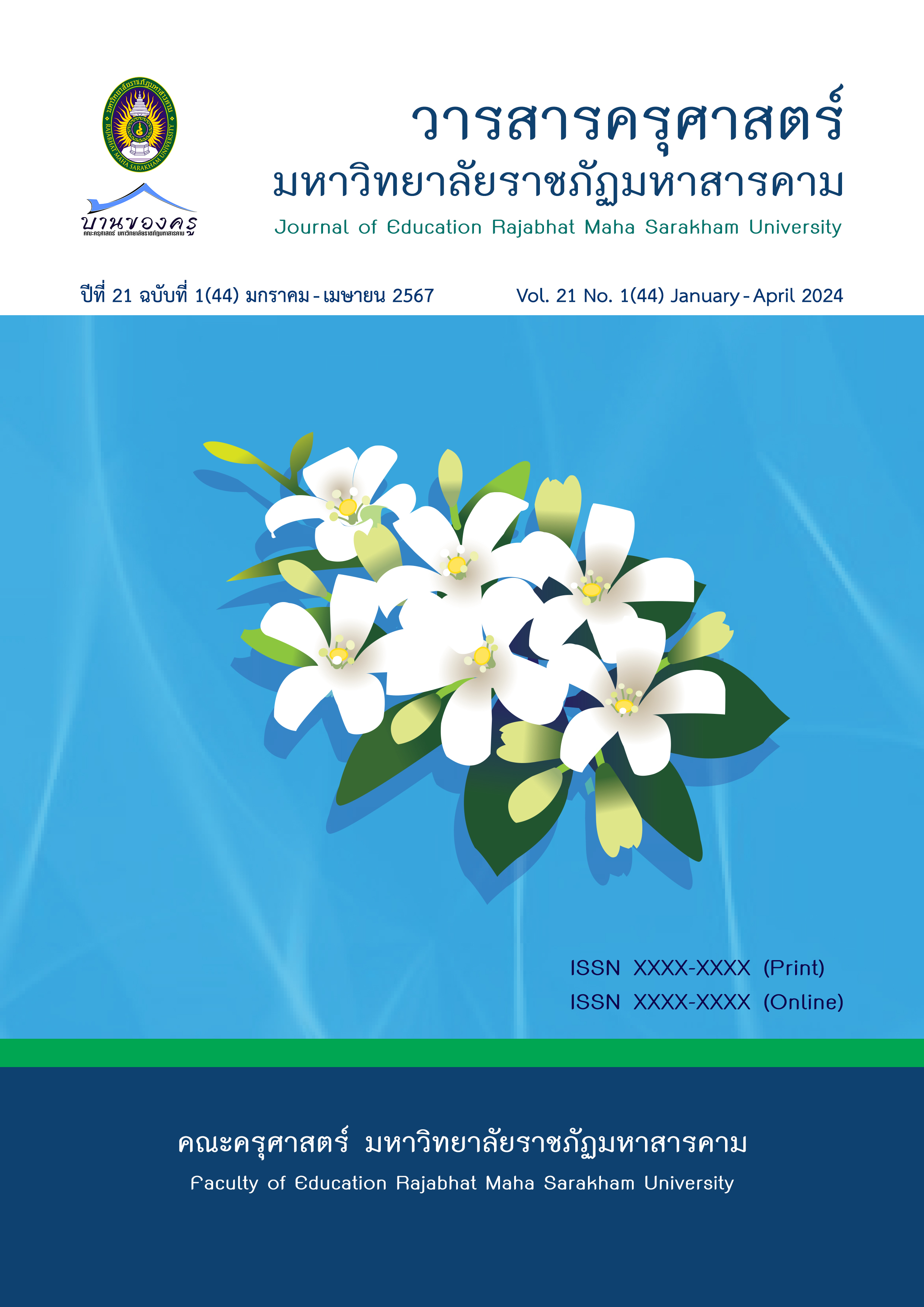Development of Good Citizenship of Mathayomsuksa 4 Students with The Cooperative Learning STAD Technique
Main Article Content
Abstract
The purposes of this action research was to development of Matthayomsuksa 4 students’ good citizenship attribute by using the STAD cooperative learning activities within the domains of Social Studies, Religion, and Culture. The sample of the research consisted of 17 students from Kae Dam Wittayakhan School, academic year of 2021. The research tools were: 1) A comprehensive plan for learning activities. 2) A gauge comprehension of citizenship concepts test. 3) The observing citizenship-related traits questionnaire. 4) The conducting interviews on matters of citizenship questionnair. The statistical techniques employed in this research encompassed assessments of validity, difficulty determination, discriminant power analysis, and the calculation of confidence intervals, percentages, and arithmetic means.
The findings indicated that in the first cycle, the students’ good citizenship attribute scores were at 71.37% and in the second cycle, they earned higher citizenship score at 79.60%. These results improved the students’ good citizenship attribute and integrated with social media which a new choice for learning, motivated them, and made them confident to reply and giving opinion. Their relationship and good citizenship attribute with their friends were higher that facilitated their concrete learning improvement.
Article Details

This work is licensed under a Creative Commons Attribution-NonCommercial-NoDerivatives 4.0 International License.
ข้อกำหนดเบื้องต้นที่ผู้นิพนธ์(ผู้ส่งบทความ) ควรทราบ
1. ผู้นิพนธ์ที่ประสงค์จะลงตีพิมพ์บทความกับวารสาร ตั้งแต่เดือนมกราคม 2563 เป็นต้นไป ให้ใช้รูปแบบใหม่ (Template 2563) โดยสามารถดูตัวอย่างได้ที่เมนู GUIDELINES
2. จะตีพิมพ์และเผยแพร่ได้ ต้องผ่านการประเมินจากผู้ทรงคุณวุฒิ (Peer Review)
3. การประเมินบทความโดยผู้ทรงคุณวุฒิ (Peer Review) เป็นแบบ Double Blind
4. การอ้างอิงบทความใช้หลักเกณฑ์ APA (American Psychological Association) คลิก
5. บทความถูกปฏิเสธการตีพิมพ์ ไม่ผ่านการประเมิน ผู้นิพนธ์ขอยกเลิกเองหรือชำระเงินก่อนได้รับการอนุมัติ ทางวารสารไม่มีนโยบายการคืนเงิน
References
กระทรวงศึกษาธิการ. (2551). หลักสูตรแกนกลางการศึกษาขั้นพื้นฐาน พุทธศักราช 2551 (พิมพ์ครั้งที่ 3). โรงพิมพ์ชุมนุมสหกรณ์การเกษตรแห่งประเทศไทย.
กัญญารัตน์ เชียรพิมาย และ วรางคณา เทศนา. (2564). การพัฒนาทักษะการอ่านและการเขียนสะกดคำที่มีตัวการันต์ โดยใช้แบบฝึกทักษะประกอบการจัดการเรียนรู้แบบร่วมมือ STAD สำหรับนักเรียนชั้นประถมศึกษาปีที่ 5. วารสารวิชาการสถาบันพัฒนาศักยภาพกำลังคน, 1(2), 89-101.
จรัส พิเลิศ, มะลิวัลย์ ถุนาพรรณ์ และ นิภาพร ชุติมันต์. (2564). การพัฒนากิจกรรมการเรียนรู้คณิตศาสตร์ เรื่อง ลำดับของนักเรียนชั้นมัธยมศึกษาปีที่ 6 โดยใช้การเรียนรู้แบบร่วมมือเทคนิค STAD ร่วมกับการใช้สื่ออิเล็กทรอนิกส์. วารสารมหาจุฬานาครทรรศน์, 8(3), 367-380.
จรินทร อุ่มไกร และ ไกยสิทธิ์ อภิระติง. (2562). การพัฒนาสื่อดิจิทัลร่วมกับเทคโนโลยีความจริงเสริมโดยอาศัยการเรียนรู้แบบร่วมมือด้วยเทคนิค STAD ในรายวิชาคอมพิวเตอร์ ชั้นประถมศึกษาปีที่ 6. วารสารโครงงานวิทยาการคอมพิวเตอร์และเทคโนโลยีสารสนเทศ, 5(2), 18-27.
วีรวิชญ์ บุญส่ง. (2564). การเปรียบเทียบผลสัมฤทธิ์ทางการเรียนของนักเรียนชั้นประถมศึกษาปีที่ 2 โดยการจัดการเรียนรู้แบบร่วมมือ เทคนิค STAD และแบบสืบเสาะหาความรู้. วารสารวิชาการ สถาบันเทคโนโลยีแห่งสุวรรณภูมิ, 8(1), 53-65.
สำนักงานเลขาธิการสภาการศึกษา. (2560). แผนการศึกษาแห่งชาติพ.ศ. 2560-2578. พริกหวานกราฟฟิค.


